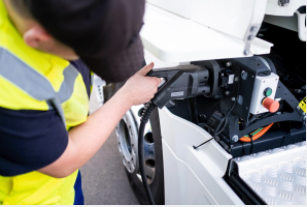The Society of Motor Manufacturers and Traders (SMMT) is calling for more Government support and a road-map for the commercial vehicle industry’s switch to zero emissions before the 2040 deadline.
A new SMMT report reveals that the commercial, technological and operational barriers currently associated with new technologies such as batteries and hydrogen meant that in 2020, only 0.2% of heavy goods vehicles (HGVs) were alternatively fuelled – contrasted with cars, which reached this proportion in 2007.
While all of Europe’s major truck manufacturers have agreed that new HGVs will be fossil fuel-free by 2040 – and are investing billions in new powertrains to replace diesel – it warns that there is no clear technology that can provide full zero emission operations for all weights and uses of HGVs.
Battery electric van usage, meanwhile, reached 0.3% in 2020 – the same proportion as cars in 2019, it adds.
Uptake rates for electric vans have continued to grow rapidly, reflecting how battery power can effectively replace fossil fuels in this vehicle class, but just 2.6% of new vans registered between January and July 2021 were battery electric vehicles (BEVs), compared to 8.2% of cars.
Established manufacturers have already brought a range of fossil fuel-free HGVs and vans to market, while several new players have also entered the market with dedicated zero-emission commercial vehicle portfolios.
Infrastructure ‘biggest barrier to update’
The SMMT said infrastructure is acting as one of the biggest barriers to uptake.
It says the UK needs a dedicated public HGV charging network, as only operators who can afford to invest in expensive depot infrastructure and operate on a back to base model can currently make the switch.
It said the network needs to be rolled out “urgently” – with European manufacturer trade body ACEA forecasting that by 2030, the UK will need 8,200 public HGV charging points, equivalent to more than two new charge points opening every single day until the end of the decade.
Alternative technological solutions, such as hydrogen fuel cell vehicles, face an even tougher challenge with only 11 refuelling locations across the country.
SMMT chief executive Mike Hawes said: “The industry is committed to be fossil fuel-free, but there is not yet a clear technology path for every weight class and every use case.
“Before it sets a deadline for the sector, the Government must support the technological development and market proposition and provide the right framework, so hauliers don’t defer their decarbonising decision to the last minute. Plans before bans is the key.”
Hawes said vans face fewer obstacles in the decarbonisation journey compared with HGVs, but adoption rates remain low, driven by a lack of charging points and higher operating costs relative to diesel.
He added: “The new models are there, with many more coming, but without investment in incentives and infrastructure, the commercial vehicle sector will struggle to meet our shared ambition to reach net zero.”

